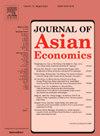电子商务如何重塑农村产业转型:来自中国农村电子商务示范县的证据
IF 3.4
3区 经济学
Q1 ECONOMICS
引用次数: 0
摘要
在数字经济新背景下,基于数字平台的电子商务已成为推动农村特别是发展中国家农村产业转型的重要动力。本研究基于农村电子商务示范县(REDC)项目的准自然实验,采用2000-2020年中国县级数据,采用时变DID方法结合机器学习技术,探讨农村电子商务对产业结构转型的影响。研究结果表明,区域经济发展中心对产业升级具有显著促进作用,但由于资源禀赋和发展水平的差异,区域经济发展中心对产业升级的促进作用存在差异。机制分析表明,农村电子商务通过劳动力再配置、创业资源动态调整和产业集聚三个主要渠道驱动产业升级。进一步分析表明,农村电子商务还具有促进产业协调发展的作用。利用机器学习方法,我们确定了农村电子商务与产业升级之间的非线性关系,这种关系表现为三个不同的阶段:初始适应、快速升级和稳定发展。本文提出差异化的电子商务方案、顺畅的要素流动体系和产业规划将有助于农村适应电子商务环境,从而促进农村经济转型。本文章由计算机程序翻译,如有差异,请以英文原文为准。
How e-commerce reshape rural industrial transition: Evidence from China’s rural e-commerce demonstration counties program
In the new context of the digital economy, e-commerce based on digital platforms has become an important driving force for rural industrial transformation especially in developing countries. Based on the quasi-natural experiment of the Rural E-Commerce Demonstration County (REDC) program, the study uses the county-level data from China (2000–2020), and employs a time-varying DID method combined with machine learning techniques to explore the impact of rural e-commerce on industrial structure transformation. The findings indicate that the REDC program significantly fosters industrial upgrading, with varying effects across regions due to differences in resource endowments and development levels. Mechanism analysis suggests that rural e-commerce drives industrial upgrading through three primary channels: labor reallocation, dynamic adjustment of entrepreneurial resources, and industrial agglomeration. Further analysis indicates that rural e-commerce also plays a role in promoting coordinated industrial development. Utilizing machine learning methods, we identify a nonlinear relationship between rural e-commerce and industrial upgrading, which unfolds in three distinct stages: initial adaptation, rapid upgrading, and stable development. This paper proposes that differentiated e-commerce programs, smooth factor mobility systems, and industrial planning will assist rural areas in adapting to the e-commerce context and thereby facilitate rural economic transformation.
求助全文
通过发布文献求助,成功后即可免费获取论文全文。
去求助
来源期刊

Journal of Asian Economics
ECONOMICS-
CiteScore
4.70
自引率
9.40%
发文量
90
期刊介绍:
The Journal of Asian Economics provides a forum for publication of increasingly growing research in Asian economic studies and a unique forum for continental Asian economic studies with focus on (i) special studies in adaptive innovation paradigms in Asian economic regimes, (ii) studies relative to unique dimensions of Asian economic development paradigm, as they are investigated by researchers, (iii) comparative studies of development paradigms in other developing continents, Latin America and Africa, (iv) the emerging new pattern of comparative advantages between Asian countries and the United States and North America.
 求助内容:
求助内容: 应助结果提醒方式:
应助结果提醒方式:


